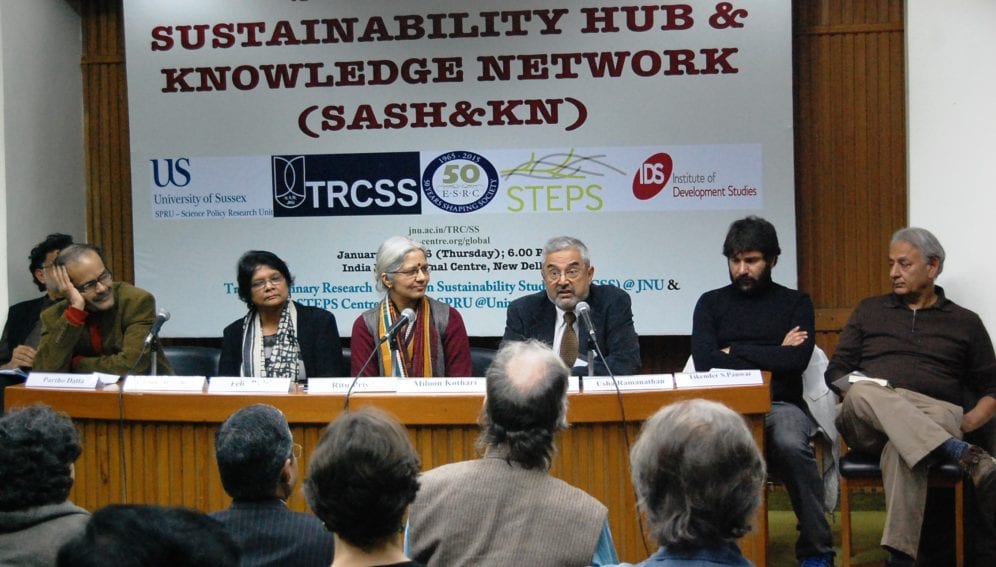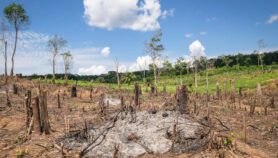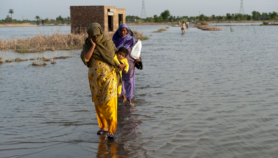By: Archita Bhatta
Send to a friend
The details you provide on this page will not be used to send unsolicited email, and will not be sold to a 3rd party. See privacy policy.
[NEW DELHI] Uncertainties are a crucial part of climate change narratives and need to be accounted for in policy-making, say leading climate change experts and social scientists at a conference organised during the launch of the South Asia Sustainability Hub in New Delhi in January.
Climate change narratives remain incomplete until studies take into account the lived experiences of indeterminate factors such as unexpected drought or over-precipitation said Anshu Ogra, scholar at the Jawaharlal Nehru University’s Centre for Studies in Science Policy.
Ogra presented a paper highlighting glaring uncertainties in coffee production projections due to unpredictable weather conditions. According to the latest International Coffee Report, the Coffee Board of India has reduced the production forecast for 2014—15 by four per cent due to unfavourable weather. However, the same report says that the expected output of the two varieties of Indian coffee would still be up from that of 2013—14.
Ogra’s paper notes that the concern is about the expected yield and not the realised yield. “How does this fluctuation in expected yield, due to variation in weather, inform the growers’ risk when the realised yield might actually be better than the previous year.”
Dom Kniveton and Gino Fox from the University of Sussex, UK, argued in another presentation that rather than trying to minimise uncertainty it should be embraced as a space “where power can be challenged and social learning undertaken, leading to transformative action.”
Quoting earlier studies the researchers said that the evolution of the atmosphere could be minute perturbations in the initial conditions of the atmosphere. These perturbations are so small that realistically no system of observation could ever specify them, thereby ruling out possibility of predictions with absolute accuracy.
They also pointed out that uncertainty in a forecast increases more quickly for smaller spatial phenomena, such as thunderstorms, than for large scale phenomena such as winter storms.Lyla Mehta visiting professor, Norwegian University of Life Sciences, and her team in their paper ‘Climate change and uncertainty from above and below: Perspectives from India’ stressed that it has now become imperative to look at climate change and uncertainty from “the above”. Diverse framing of uncertainty lead to varied discourses of uncertainty from ‘above’ and ‘below’.
Mehta — who is co-leader Resource Politics Cluster, Institute of Development Studies and organiser of the conference along with Steps Centre, Indian Institute of Health Management University and the Norwegian University of Life Sciences —
said ontological differences exist in how climate change is conceptualised and understood by different actors across ‘above’, ‘middle’, and ‘below’, and how uncertainties manifest themselves in diverse discourses and practices.
Mehta’s paper adds that scientists and their disputes, discussions, diatribes and scientific models dominate the climate change dialogue, which has often led to ‘Himalayan’ errors of statements such as the understanding that Indian glaciers will vanish in our lifetime.
The conference also discussed the importance of focusing on the political economy of climate change uncertainty, the implications for social justice across multiple scales and how policies all over the world are increasingly moving away from this approach.
“Neoliberal policies the world over are increasing uncertainties of climate change and hence we need greater focus on the political economy of climate change,” said Rohan D’Souza, associate professor at Kyoto University’s Graduate School of Asian and African Area Studies.














